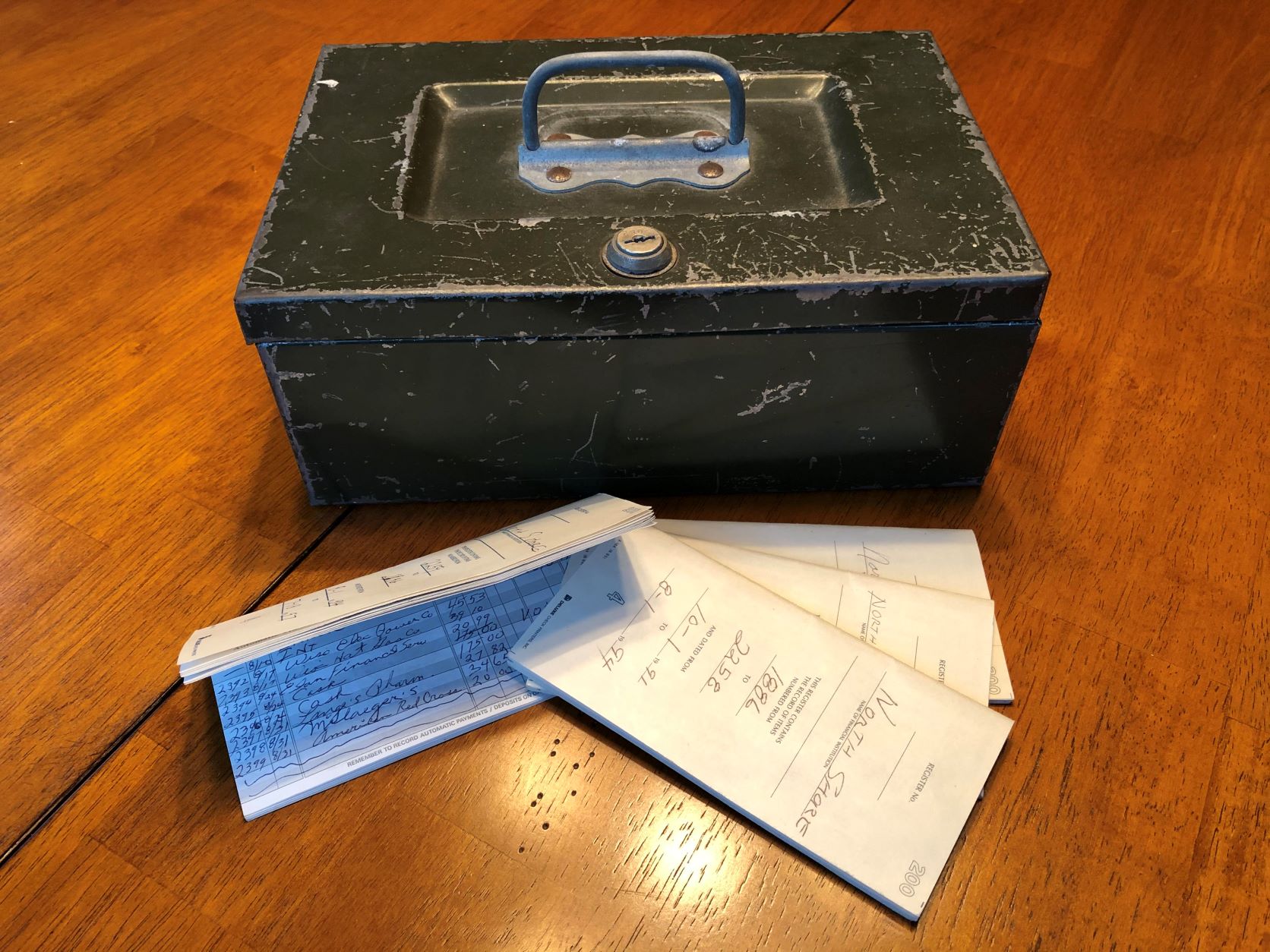Finalist Entry for 2022 Writer of the Year Contest--Balancing the Checkbook of Your Life

If you're new to this newsletter, you haven't seen this entry. If you have followed me for the past few years, perhaps you've read it. This is the issue that is currently a finalist in the WRITER OF THE YEAR contest sponsored by Serious Writer, Inc. A winner will be declared in November, 2022.
I share this issue again here, not just because it's a finalist, but because it deeply resonates with me--and I hope it will with you too.
I have often asked myself of the almost 75 issues of PAUSE MORE. RUSH LESS., which one is my favorite? That is so hard to say. But ONE of my favorites, in addition to this one, is at the bottom of this essay.
Thank you all for following this newsletter so faithfully. More to come.
~
Today, I was putzing in the garage—it’s what men do. We fiddle around, straightening rakes, hoes, shovels, brooms, old car parts, and lawn equipment. On the bottom shelf of my workbench is a small drab-green metal box. It isn’t a new discovery. I knew it was there—and I know what lies inside. I just don’t like to go there—so I buried it—among shop rags, shopping bags, and an old toolbox.
I avoid the box because under the lid are memories that cut deep enough to bleed. I believe my father acquired it in the military. It’s built like a tank and has been resting there in partial view for thirteen years, since his death in 2008. I can’t bring myself to open it—much less part with it. He used it as a file box for his checkbooks and used checkbook registers.
When I saw it today, peeking out between the rags, I caved. I opened it, slowly flipping through his long-canceled checkbook registers. Gazing at his entries, I realized how a checkbook reflects life.
“The measure of a life, after all,
is not its duration, but its donation.”
Corrie Ten Boom
In any checkbook, between the bills that define our lives; gas, electric, phone, newspaper, groceries, entertainment, home repairs, tuition, taxes—are the things we give our lives to: our kids, grandkids, charities, and so on.
My father was wise with money and had a gifted mind for numbers—often able to make complex computations in his head.
As his personal representative, and later executor of his estate, he had me actively involved in his financial affairs—long before Alzheimer’s stripped him of his financial acumen. His penmanship in his checkbook was superb until the ravages of the disease stole his ability to balance it. As I flipped through the pages of his expired checkbooks, the story I avoided unfolded once more. No longer able to add and subtract, he would strike through his errors, scribble new balances, and often give up in frustration. I remember encouraging him as he reluctantly asked for my help.
Here was a man, who at the peak of his intellectual powers, was so proficient with numbers he was the cost accounting manager at Chrysler Corporation. Now he struggled to balance his checkbook. Every month, he sat humbly—and courageously—with me at his kitchen table and granted me the privilege to assist him. I remember how he felt—how I felt—since he was aware of what was happening to him. One more skill fading forever.
Today, as I flip through these old checkbook registers—spanning decades—I realize how our checkbook tells a story. In a small way, it reflects our life—or at least, snapshots of it. It catalogs our once daily routines, monthly obligations, spending habits, priorities, generosity, and what we gave our life to. And something more. It captures our youth. Good health. Glimpses of our former life and happier times—like a favorite Christmas gift we purchased years ago for a loved one.
All of my siblings have kept mementos of his life—keepsakes that resonate with each one of us differently—and personally. My older brother has his dog tags from the Marine Corps after his tour of duty in the South Pacific and Iwo Jima. My younger brother kept a pair of his work shoes, complete with duct tape, to hold them together. (Men from The Great Depression throw nothing away.) My sisters possess his favorite slippers, eyeglasses, his felt fedora, and wallet. And I, besides this box, still hold his two most cherished gifts—his watch and wedding ring—both gifts from my mother, whom he lost when I was eleven.
Now, as I close the lid of his metal box, this memory box, perhaps for the final time, the irony is not lost on me: his life—like his checkbook—was well balanced.
###
SOMETHING TO CHEW ON: What keepsake or reminder of a loved one’s life have you kept to remind you of them? Why does it resonate with you? What might your family keep of yours to remember you? Let me know at: jamescmagruder@gmail.com.
###
As I near the publication of the 75th issue of PAUSE MORE. RUSH LESS., I have been thinking about all the past issues and which are my favorites. One issue that resonated the the most with me as a writer is this one:
https://jamescmagruder.com/news/how-revisiting-past-enriches-present
You can find all past issues of this newsletter on my website under the BLOG tab if you want to review where we've been, what we've discussed, and how this newsletter got started.
Please feel free to ask me a question, leave a comment, or join my mailing list by subscribing to my FREE newsletter, PAUSE MORE. RUSH LESS. below. We'll talk about how to slow down your life to live it more fully.

